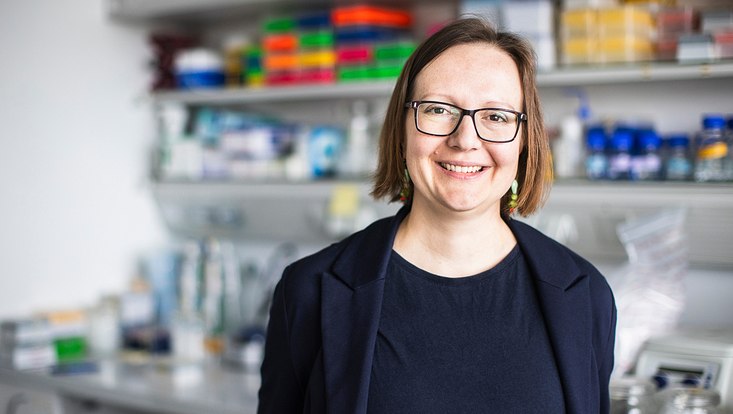Welcome aboard!“I am especially interested in fast evolutionary processes.”Prof. Dr. Kathrin Anna Otte strengthens the natural sciences.
27 October 2023, by UHH/Latos

Photo: UHH/Esfandiari
Every year, Universität Hamburg welcomes numerous new researchers. This series introduces them and their areas of research. This time: Prof. Dr. Katharin Anna Otte. She is a professor of biology with a focus on population genomics. She does research on how environmental changes impact the genomes of water fleas.
Prof. Dr. Kathrin Anna Otte left the University of Cologne this past winter semester to join the Faculty of Mathematics, Natural Sciences and Informatics as a professor of biology.
You are a professor of biology with a focus on population genomics here at Universität Hamburg. Can you explain briefly what you will be looking at in your research?
Most people probably know the term “species”—for example, the fly and the worm are different species. Many individuals of a species that reproduce with one another form a population. When we consider how genes transmit certain features within a given population, then we are talking about population genetics. And population genomics essentially builds upon the notion of population genetics: here is where we apply the latest developments in DNA-sequencing technology, not only to analyze individual genes but also the entire genome.
What questions particularly interest you?
I am especially interested in fast evolutionary processes. Normally, when we hear the term “evolution,” we think of processes over thousands, if not millions of years. Yet in fact, populations can adapt genomically speaking very fast, for example, to changing environmental conditions.
Can you give us an example of these changing environmental conditions?
A classic example is anthropogenic factors, meaning changes caused by human beings. For example, insecticide, to which pests in the field can adapt fairly quickly.
And what organisms do you research?
The main organism model I work with is the water flea. These are small freshwater crustaceans that play a crucial role in the food web in inland bodies of water. I am interested in how changes in the water impact the water flea and as a result the food web. In fact, I chose the lake ecosystem carefully because it has the advantage of being a very concrete ecosystem about which we know a great deal related to the seasons.
Which lakes will you study?
Currently, I am focusing on lakes in Germany. Because I come from Cologne, I am looking primarily at lakes in the Lower Rhine region. But I will also add some lakes in Hamburg that are easily accessible and for which there is already data. That is important so that I know what kind of lake it is. On the way to Plön there are a few lakes that have already been well studied.
What research methods do you use?
On the one hand, I study natural populations in lakes. On the other, I take an experimental evolution research approach. That means that I move a population from nature to the lab, simulate evolution, and investigate how the genome changes over generations. This way I can find out why certain genome types of water fleas can survive so well in various lakes. Can they live well with little food? What happens to them when water warms up? I also use bioinformatics and statistics to undertake the simulations and develop hypotheses.
Do you also seek cooperation within the University?
The water flea is also zooplankton and at Universität Hamburg, there are a few colleagues working with marine plankton. Naturally, it would be exciting to see where there are parallels and where cooperation is possible. I know that my colleagues have interesting methods for studying and characterizing plankton in the field. So I hope that I can also learning something about that.
What are your teaching plans?
I will definitely offer courses on population genetics and genomics. I also want to illuminate new genomic technologies and use them in my courses. For example, there is a new technology that facilitates sequencing in the field. This is one of my future projects: I would like to offer field trips so that we conduct genoanalyses on site.
As you just mentioned Cologne—you studied in Berlin, did your doctorate in Munich, and were a postdoctoral researcher in Vienna and Cologne. Now you’ve come to Hamburg. Why did you move here?
The professorship was just a really good match. And of course, Hamburg is a University of Excellence, a great deal of research on the climate and climate changes is conducted here, and it just is all a really good fit. Moreover, Hamburg is a beautiful city that my family said they could imagine living in. That is also an important factor, of course.
What are you especially looking forward to in Hamburg?
I have never lived this far north. I am especially looking forward to the proximity to the ocean and to live on the Elbe.


